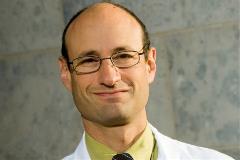Academic and Clinical Excellence
As physicians and scientists, the Cardiovascular Medicine faculty brings intellectual curiosity, scientific rigor, and fundamental concern to our patients, our students, our colleagues, and the communities we serve.
We advance knowledge and innovation and enhance efficiency through clinical, translational, and mechanistic research studies designed to improve the care of patients with cardiovascular disease. We are dedicated to patient-centric treatment of individuals with cardiovascular disease and to developing the next generation of cardiac physicians and scientists.
In the News

UVM Assistant Professor of Medicine Daniel Lustgarten, M.D., Ph.D., discusses the benefits of leadless (wireless) pacemakers, which is implanted without surgery and currently in the clinical trial phase, on local CBS affiliate WCAX-TV for the HealthWatch segment. Watch the
interview here.